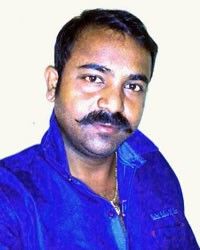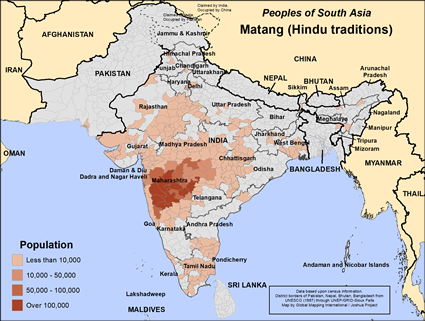Matang (Hindu traditions) in India

Photo Source:
Anonymous
|

Map Source:
People Group data: Omid. Map geography: UNESCO / GMI. Map Design: Joshua Project.
|
| People Name: | Matang (Hindu traditions) |
| Country: | India |
| 10/40 Window: | Yes |
| Population: | 2,619,000 |
| World Population: | 2,619,000 |
| Primary Language: | Marathi |
| Primary Religion: | Hinduism |
| Christian Adherents: | 0.15 % |
| Evangelicals: | 0.00 % |
| Scripture: | Complete Bible |
| Ministry Resources: | Yes |
| Jesus Film: | Yes |
| Audio Recordings: | Yes |
| People Cluster: | South Asia Dalit - other |
| Affinity Bloc: | South Asian Peoples |
| Progress Level: |
|
Introduction / History
The Matang are a small group living in southwest India. They are considered outside the standard four caste Hindu social system and face daily discrimination by other Hindus. According to Buddhist legend, a Matang girl was asked by a follower of the Buddha for water. The girl answered that she could not give him water because she was from outside of the Hindu caste system. The Buddhist man said he wanted water and did not care what caste she was from. The girl left her village and became a Buddhist nun. They are still mainly Hindu, but some are Buddhist now.
What Are Their Lives Like?
The Matang do manual labor such as digging holes for construction sites. Some do farm work on land owned by others. Most of Matang live in extreme poverty. Most cannot read or write. A few have taken advantage of India's public schools and found better jobs. The Matang are known for having tattoos. They have their own music and drama based on oral tradition. Families arrange marriages within the Matang group. Cousin marriages are common with the girls marrying as young a 11 or 12. A man can have multiple wives if he can afford them. Property is inherited by the sons. Village elders settle legal issues and promote Matang interests.
What Are Their Beliefs?
The Matang practice Hinduism, the ancient religion of India. They may get their name from the Hindu goddess, Matangi. She is worshipped as the goddess of music and supernatural power by her devotees. She is one of the many forms of the mother goddess Devi. Hindus believe that by performing rituals and good works that they will attain moksha or freedom from the endless cycle of birth, death and rebirth. The Matang people visit Hindu shrines and offer prayers, food, flowers, and incense to their gods in hopes of gaining protection and benefits. They do not have a personal or familial relationship with their gods like Christians do. There are many forms of Hinduism, each with its own deities and beliefs. The main yearly holidays of the Matang people are Holi, the festival of colors and the start of spring, Diwali, the festival of lights, Navratri, the celebration of autumn and Rama Navami, Rama's birthday. The caste system divides Hindus into four main categories. The lowest communities are outside of the caste system. Unfortunately, the Matang belong to this last group.
What Are Their Needs?
The Matang would benefit by teams of teachers and medical workers coming to them. The Matang need job skills that can help raise their low standard of living.
The primary language of the Matang is Marathi. Many resources are available in Marathi including a complete Bible and the JESUS Film. The gospel will need to be presented to the Matang in visual and oral forms since many cannot read.
Prayer Points
Pray that village elders come to Jesus Christ and lead the others of the Matang to salvation also. Pray that God has teams of workers go to the Matang to help with their physical needs. Pray for an unstoppable disciple making movement begins and flourishes among the Matang. Pray that the Lord sends Hindu background believers to tell the Matang about Jesus.